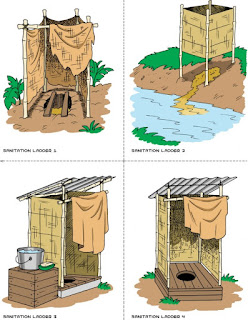Why start a blog on sanitation in Africa?
Some interesting facts from Rose's 'The Big necessity' to start you off:
- 2.6 Billion people don't have access to sanitation
- 4 in 10 don't have access to latrines, toilets, buckets or boxes
- Poor sanitation causes 1 in 10 of the world's diseases
- In the last decade Diarrhoea has killed more people than all people killed in WW2
Rose George has had a huge impact on me since watching her TED talk a few years ago. Every year I show her 'Let's talk crap' Ted Talk in its entirety to Year 9s when studying 'Challenges of Urban growth'. Students are fascinated by her message: We simply do not talk enough about sanitation. And we need to. We need to if we are going to have a significant impact on a vast array of development areas within the Sustainable Development goals: Water, Health, Gender are but some of the key issues.
In my blog I plan to look into why sanitation is so important. I'll look at case studies where sanitation schemes have or haven't worked, with a particular focus on parts of Africa, and hopefully evaluate the idea that sanitation is one of the most important issues we are currently facing when discussing water security.
In short I have been inspired to 'talk crap'.
What do we mean by the term sanitation?
We often might think of sanitation as simply anything to do with the disposal of waste from human bodies, however the term is more broad and it is important to have a clear definition. The WHO defines the term sanitation as "Sanitation refers to the provision of facilities and services for the safe management of human excreta from the toilet to containment and storage and treatment onsite or conveyance, treatment and eventual safe end use or disposal." This can therefore include a wide range of schemes or strategies ranging from education programmes about cleanliness through to provision of flush toilets.
Why the focus on Africa?
We often might think of sanitation as simply anything to do with the disposal of waste from human bodies, however the term is more broad and it is important to have a clear definition. The WHO defines the term sanitation as "Sanitation refers to the provision of facilities and services for the safe management of human excreta from the toilet to containment and storage and treatment onsite or conveyance, treatment and eventual safe end use or disposal." This can therefore include a wide range of schemes or strategies ranging from education programmes about cleanliness through to provision of flush toilets.
Why the focus on Africa?
A quick trawl of internet searches will bring up a range of maps which suggest that Africa is lagging behind other regions in terms of access to safe drinking water (Our World in Data: https://ourworldindata.org/water-access).
The map suggests that many parts of Sub-Saharan Africa still lag behind in terms of 'improved drinking water'. But as we have seen from George's Ted talk, there is a necessity to tackle both water supply and sanitation. Once again Sub-Saharan Africa has some of the lowest levels of progress on these measures: https://ourworldindata.org/sanitation
There is clearly a need to address these issues, but does this really tell the whole story? I want to see if there are stories which we can tell which avoid the 'Danger of the single story'. Take a simple look at GapMinder's wonderful resource Dollar Street, for example and you will be able to see variances within regions, countries and although it doesn't show it presumably cities. Below is a selection of toilets sampled in Africa, note particularly Nigeria's presence.
I am excited about the prospect of researching this amazing topic more widely; unearthing more positive stories and try to reflect a more well rounded story which avoids, as far as possible, generalisations about a continent full of challenges, yes, but also disparities.





A very interesting topic. I enjoyed the Ted talk. I would find it helpful to understand what is you mean by Sanitation - I have looked it up but it seems to include a very wide variety of aspects. What do you mean by it?
ReplyDeleteI think that the WHO definition characterises "sanitation" quite well and holistically. Perhaps some specific examples of the forms that sanitation takes in practice would help here. You certainly do this well in subsequent posts.
ReplyDelete